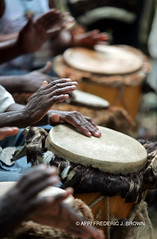I haven't posted lately because, on top of a demanding work schedule, I have been and will be traveling in the next few days. Last weekend, I popped out of Barranquilla unexpectedly, finding myself in the tranquil lil burg of Valledupar (va-yay-doo-PAR), about four hours down a winding, rickety road in the north of Colombia. Valledupar is the "World Capital of Vallenato," an ultra-popular brand of Colombian folk music centered around the somewhat shrill accordion. I don't like the music, but I enjoyed my stay in the city. The people I bunked with (a friend's family) showed me the town's beautiful swimming gorge, lorded over by a two-ton bronze mermaid; never once called me "El Gringo," respectfully using my name the entire time; and made sliced cow tongue with coconut rice for lunch on Saturday. Yes, it was good! I should have taken pictures but, alas, I'm dumb.
Friday, I'm off to the 23rd Annual Drum and Cultural Festival at San Basilio de Palenque, near the former slave port of Cartagena (two hours down a slightly better highway). Palenque was established as a runaway slave settlement and has been honored by UNESCO (the United Nations' cultural arm) for being the only such settlement still in existence today (though now its residents are, of course, not runaway slaves), and is one of only a few cultural offerings universally recognized in Colombia as African in origin and not absorbed into the mainstream (yet still Africanized, whether they admit it or not) culture of the Caribbean coast. Despite this honor, Palenque remains a marginalized community mired in poverty and lack of opportunities for young people. In 2006, CNN aired a story on Palenque's history, Creolized Spanish, and "talking drums":
I'm excited!
Saturday night through Monday finds me in Bogotá, the boisterous capital of Colombia and site of much debauchery. No, I won't be taking pictures of that. ;-)
Tuesday, October 7, 2008
Subscribe to:
Post Comments (Atom)












6 comments:
I really appreciate your blog. It really resonates with my spirit, as you are a fellow blogger.
But, I have a slight issue with one thing you say---or atleast I would like you to see it from another angle. The "raunchiness" that may seem prevalent in African based dances is just the European perception that you (we) have been indoctrinated with. Sexuality is natural and indeed woven into every corner of African society---and only until we were stolen were we brainwashed to disown our own ways and see them as dirty. But they are not...and so maybe if you think about WHY we may consider our ancestral cultural practices such as dancing to be "raunchy", then you will be more open to experience the beauty and purity within the movements of the body and how it expresses the soul.
Chi...Your point is very well taken, brother, and I changed the post. You're right about how thorough (and insidious) is the cultural brainwashing we've received, globally. Thank you for your comment.
BTW - for those just joining in...the dances I referred to as "raunchy" do not appear in the CNN clip. I was (ignorantly) referencing a dance style called champeta, which is very similar to Florida bass dances I grew up with (listening to 2Live Crew, 69Boyz, etc.).
no problem fly brother! I really enjoyed your last blog and visit this one multiple times a month. in many ways your are a role model... traveling and writing with a kind of courage i wish i had.
~j
I really eny your life right now, well, all but the thing about eating sliced cow tongue.
This is a great post! I want to hear about that cultural festival!In reference to the Unesco recognition, did they mean the only runaway slave settlment still existing in Columbia? I'm sure they know about maroon towns in Jamaica and quilombos in Brazil. Enslaved Africans were able to escape and survive in the Caribbean and South America because the geography is similar to West Africa. I have explored Accompong, a community of formerly enslaved Africans in the hills of St. Ann. The town has existed since the 1800s, has retained a Ghanian dialect and customs and is recognized as an independent state by the Jamaican government. In Brazil, hundreds of quilombos still exist in the hills and near the Amazaon. They too struggle with isolation and poverty as well as developers trying to snatch their valuable land.
Post a Comment